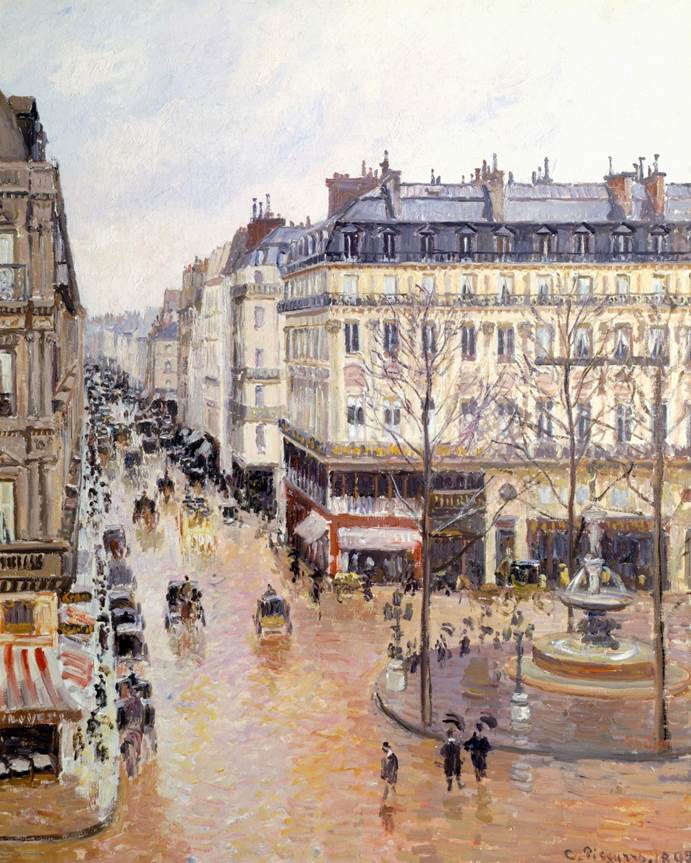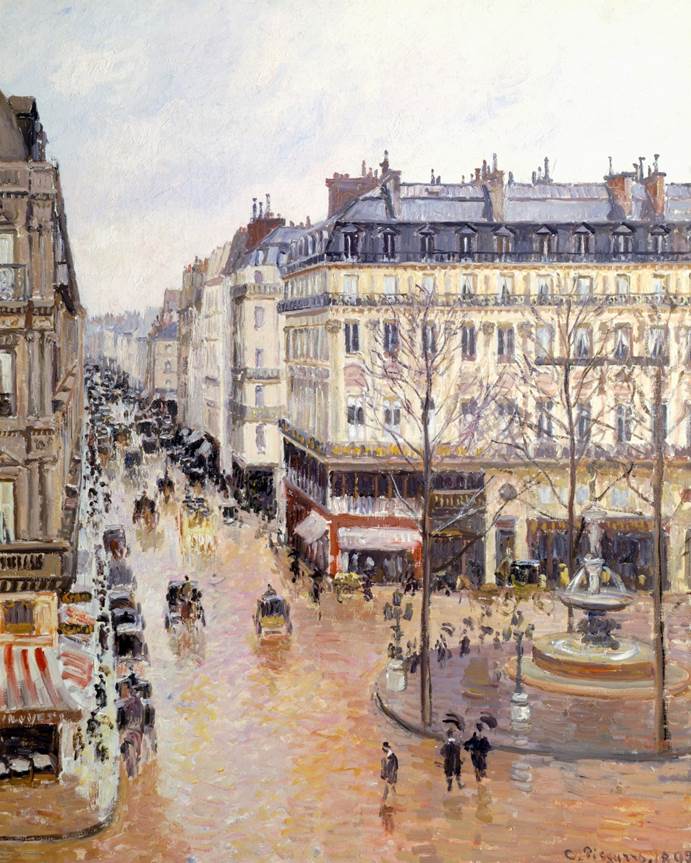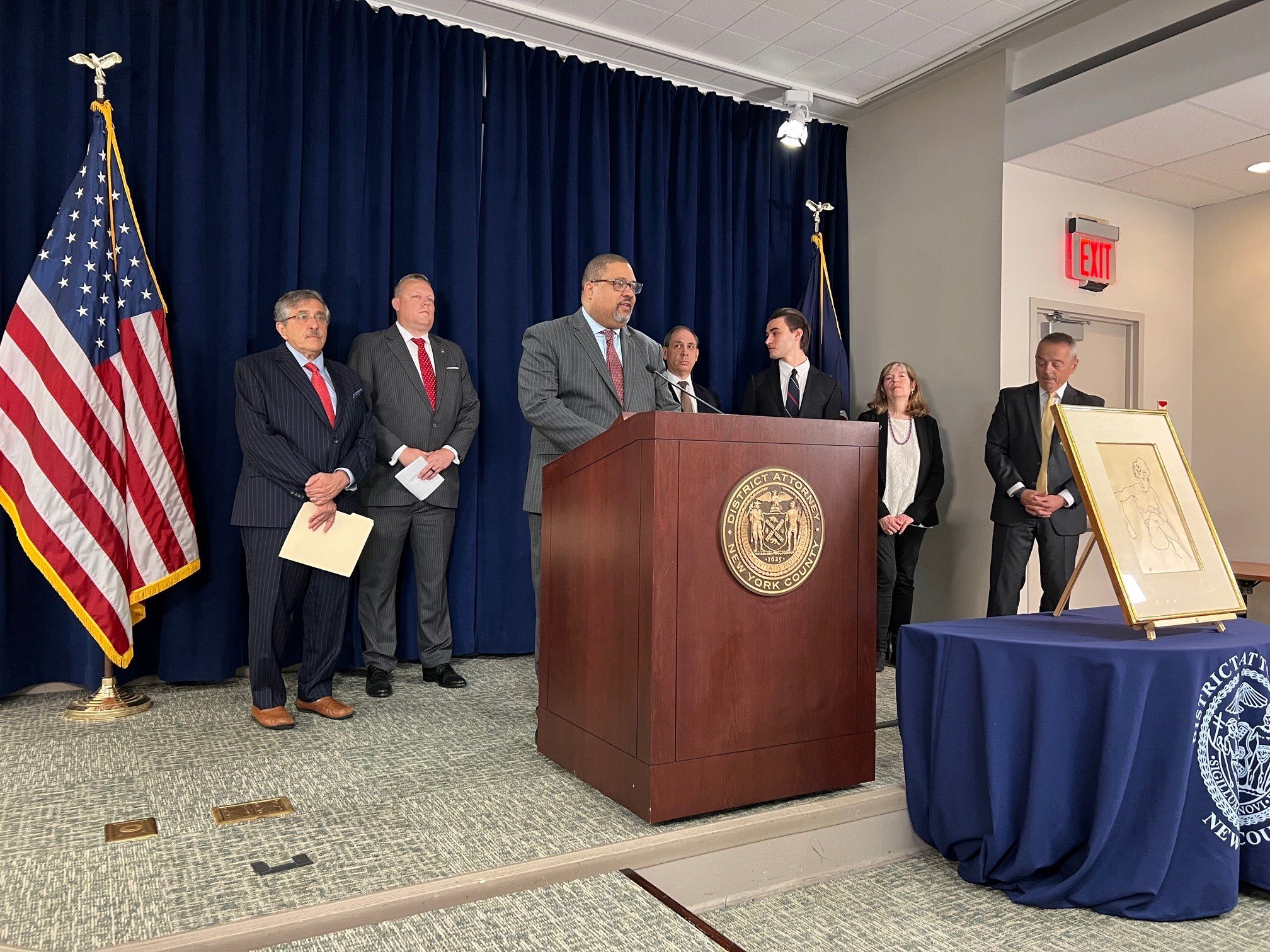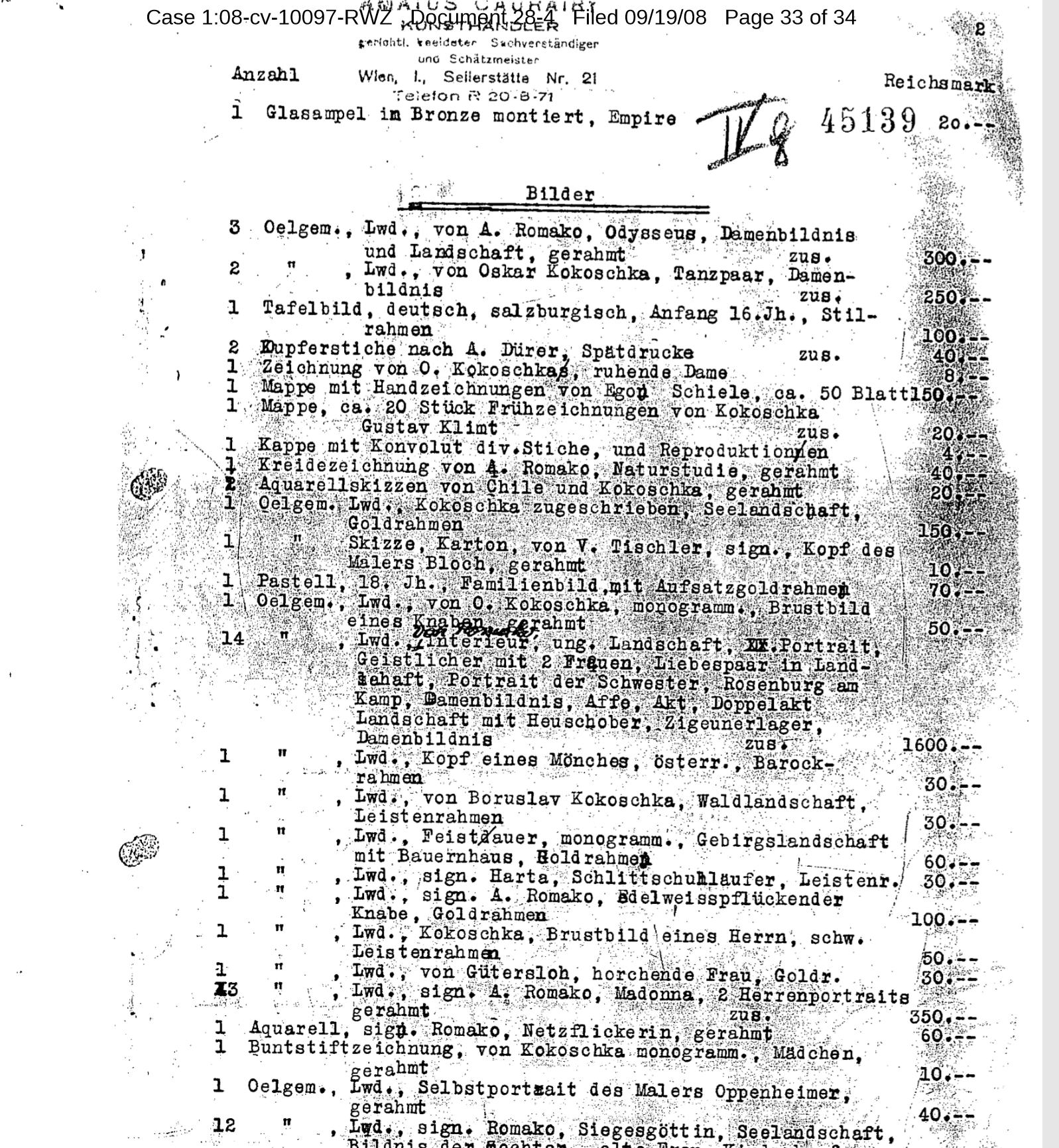I attended today’s press conference at District Attorney Alvin Bragg, Jr.’s office in Manhattan at which a drawing by Egon Schiele, Seated Nude Woman, Front View, was transferred to the heirs of Fritz Grünbaum. I represent the family of Gustav (“Gus”) Papanek, who relinquished the drawing to the District Attorney earlier this year. This case spotlights, once again, the breadth of Nazi crimes more than 80 years later. The Grünbaum story has rightly received considerable coverage (including a chapter in my book A Tragic Fate—Law and Ethics in the Battle Over Nazi Looted Art), my clients’ story is not widely known. I was honored to represent them today and throughout the process.
(Today's ceremony)
Read More
Topics:
Egon Schiele,
The New York Times,
Vienna,
Bern,
A Tragic Fate,
Eberhard Kornfeld,
Fritz Grünbaum,
Gustav (“Gus”) Papanek,
Galerie Gutekunst & Klipstein,
Alvin Bragg Jr.,
Seated Nude Woman Front View,
Ernst Papanek,
Helene Papanek

(Germany’s highest court issued a much-anticipated ruling on a challenge by a collector to the listing of his painting in the so-called Lost Art database in Magdeburg, Germany. The Bundesgerichtshof (BGH) ruled that the listing will not be deleted where “based on true facts.” The ruling underscores the informative, rather than legal, nature of the database, which describes itself as documenting “cultural property that was either demonstrably seized from their owners between 1933 and 1945 as a result of Nazi persecution, or for which such a seizure cannot be ruled out.” Insofar as the case just decided involves a well-known victim of Nazi-persecution, the clarification is a welcome and important one. As always in this area, however, the hard cases are harder. The case stopped short of resolving more nuanced cases, or addressing what recourse a collector might have in situations where a listing effectively makes a painting impossible to sell. Perhaps the best course would be to take heed of the way the court decided this case: the database is a critical tool of information, but a less useful one when it comes to sorting out legal rights.
Read More
Topics:
Lost Art Database,
Germany,
Bundesgerichtshof,
Van Gogh,
Magdeburg,
Nazi persecution,
BGH,
IFAR,
Art Loss Register,
A Tragic Fate,
Girl from the Sabine Mountains,
Francis Xavier Winterhalter,
Vue de l'asile et de la Chapelle de Saint-Rémy,
Elizabeth Taylor,
German Lost Art Foundation,
Calabrian Coast,
Kalabrische Küste,
Concordia University,
Zentrum für Kulturgutverluste,
ALR,
Düsseldorf,
Bettina Brückner

New York Governor Kathy Hochul has signed into law a new requirement requiring museums to indicate publicly any object in their collection that was displaced by the Nazis as part of what Congress has rightly called the largest organized theft of art in human history. The significance of this new rule is clear: New York is the center of the art world, and its museums hold a unique place of prominence. As readers of this blog or of my book A Tragic Fate-Law and Ethics in the Battle Over Nazi-Looted Art know, my view has long been that American museums vary widely in their candor and proactive approach to the issue of Nazi-looted art in their collections. Many have shown admirable initiative in probing their collections, while others have shown a regrettable passivity in waiting to receive and then deflect claims. Whether this bill will move the needle on that balance is the question. Transparency and disclosure have been the defining goals of the modern restitution era. This new law serves many of those ideals, but some unintended consequences may follow.
Read More
Topics:
Metropolitan Museum of Art,
American Alliance of Museums,
Nazi-looted art,
Foreign Sovereign Immunities Act,
Washington Conference on Holocaust Era Assets,
Supreme Court,
Washington Principles on Nazi-Confiscated Art,
AAM,
Museum of Modern Art,
Nuremberg race laws,
Washington Conference Principles on Nazi-Stolen Ar,
Association of Art Museum Directors,
Washington Department of Labor and Industries,
Solomon R. Guggenheim Museum,
Museum of Fine Arts Boston,
AAMD,
Military Government Law 59,
State Department,
Holocaust Expropriated Art Recovery Act,
HEAR Act,
A Tragic Fate,
Law and Ethics in the Battle Over Nazi-Looted Art,
Governor Kathy Hochul,
Reich Citizenship Law,
Animal House,
Kevin Bacon
In connection with the late-2020 amendment to the Bank Secrecy Act (BSA) to include “dealers in antiquities” as a result of its inclusion in the National Defense Authorization Act (NDAA), the Treasury Department’s Financial Crimes Enforcement Network (FinCEN) has issued a notice of “Efforts Related to Trade in Antiquities and Art.” The notice is a combination of guidance to entities now covered by the BSA, but it is also a potential backdoor around the entities that Congress chose not to regulate with respect to potential or perceived money laundering risks: art dealers. It also raises concerns about the objectivity of the forthcoming study of the art market that Congress instructed FinCEN to conduct. In either event, it is further evidence that momentum continues to gather for stricter oversight and regulation of the U.S. art market, and the importance of the art trade demonstrating more transparency and diligence if it hopes to modify or mitigate that regulation.
Read More
Topics:
The Art Newspaper,
Nazi-looted art,
Antiquities,
Terrorist financing,
Responsible Art Market initiative,
Money laundering,
FinCEN,
A Tragic Fate,
Financial Crimes Enforcement Network,
Illicit Art and Antiquities Trafficking Protection,
suspicious activity reports,
Corporate Transparency Act of 2019,
Bank Secrecy Act,
National Defense Authorization Act

The U.S. Court of Appeals for the Ninth Circuit yesterday affirmed the 2019 judgment that allowed the Thyssen-Bornemisza Collection Museum in Madrid to retain Camille Pissarro’s Rue St. Honoré, après-midi, effet de pluie (Rue St. Honoré, Afternoon, Rain Effect) (1892), a painting sold under duress by Lilly Cassirer to a Nazi in 1939. Absent rehearing by the full Ninth Circuit or Supreme Court review, the decision may bring to an end the Cassirers decades-old effort to win restitution of a painting that no one disputes is Nazi-looted art, yet the museum refuses to return. The result turns on the highly deferential standard of review for findings of fact by the trial court about the state of knowledge by Baron Hans-Heinrich Thyssen-Bornemisza when he acquired the painting in 1976. Yet the Ninth Circuit’s lack of enthusiasm for this result fairly leaps off the page, however, first with its decision to issue an unsigned opinion not for publication, and by seconding the District Court’s disappointment in the ruling under review “that Spain and TBC’s refusal to return the Painting to the Cassirers is inconsistent with Spain’s moral commitments under the Washington Principles [on Nazi-Confiscated Art] and Terezin Declaration.” The Court of Appeals’ statement about Spain and the museum that “It is perhaps unfortunate that a country and a government can preen as moralistic in its declarations, yet not be bound by those declarations” is a reminder of the limitations of these moral imperatives that, ironically, many current possessors argue are sufficient to address the problem of Nazi-looted art. It is absolutely true that moral principles often do not have the force of law. It is equally true, however, that flouting moral principles warrants moral sanction. And as multiple judges of the United States have found, Spain deserves just that.
Read More
Topics:
Terezin Declaration,
Thyssen-Bornemisza Collection,
Rue St. Honoré après-midi êffet de pluie,
Claude Cassirer,
Cassirer,
Foreign Sovereign Immunities Act,
Washington Principles on Nazi-Confiscated Art,
Stiftung Preussischer Kulturbesitz,
FSIA,
expropriation exception”,
Baron Hans-Heinrich Thyssen- Bornemisza,
Welfenschatz,
A Tragic Fate,
Reichskammer der bildenden Künste,
Jakob Scheidwimmer,
Reich Chamber of the Visual Arts,
Madrid
There has been some renewed interest in the case a decade or so ago involving a claim by the heir of Oskar Reichel’s family to a painting in the Museum of Fine Arts Boston: Two Nudes (Lovers) by Oskar Kokoschka. In response I’ve decided to post an excerpt from my book A Tragic Fate—Law and Ethics in the Battle Over Nazi-Looted Art (ABA, 2017).
It has been suggested that the MFA somehow concealed its rationale or the documentary evidence on the basis of which it concluded that the painting should not be restituted. That is simply not so, however. The MFA’s now-curator of provenance, Dr. Victoria S. Reed, authored and the MFA filed an exhaustive report of the museum’s research into the case, accompanied by primary source documents. Whether one agrees or disagrees with its conclusions, the report has been publicly available for more than eleven years. It’s no secret that I have been complimentary of the MFA’s provenance research and transparency in the case—and I don’t think anyone would accuse me of being unsympathetic to claimants generally.
The key reasons for the MFA’s conclusions that the painting had not been sold under duress included the fact that Oskar Reichel’s sons pursued restitution claims vigorously (and successfully) for both real and personal property, including paintings. They never identified this painting in their claims to looted property, however. In addition, the MFA found—and filed publicly—correspondence from Oskar’s last surviving son Raimund from 1982 that explained that the MFA painting was among those that Oskar had given to Otto Kallir to sell in the USA:
Exhibit 65 to Dr. Reed’s Report
The MFA drew the conclusion, to which there was no specific evidence to the contrary, that this was in contrast to the property that had been taken from Oskar. This is in the context of the general presumption of invalidity for transactions between 1933 and 1945 involving persecuted groups.
I have been very critical of museums that I believe have not adhered to the spirit of the Association of Art Museum Directors’ guidance on Nazi-looted art claims where I think it is appropriate. But in my opinion—and that’s all it is, my opinion—the MFA is an example of a museum worthy of praise for following those principles of research and transparency (and not only with regard to Nazi-spoliation, but its collection generally).
Please do note that some of the analysis of the applicable statute of limitations has been superseded by the 2016 Holocaust Expropriated Art Recovery Act (HEAR Act), but the case went to a final judgment before that law was passed and was thus not affected by it.
I urge you to consider the case with an open mind and reach your own conclusions. I have done my best to explain my thinking, which you may judge for yourself. The press coverage at the time was very critical (some of which resonated for me until I reviewed the case in detail), which in hindsight is probably attributable in part to the fact that I don’t recall any contemporary coverage that addressed specifically the actual research that the MFA did and made public.
The following is re-published with the permission of the author, and may not be copied, reproduced, or republished in any fashion without express written permission of the author, whom you may contact using the links on this page. A Tragic Fate—Law and Ethics in the Battle Over Nazi-Looted Art © Nicholas M. O'Donnell (2017) is available in hardcover and Kindle editions on Amazon.com. I hope you find it informative and thought provoking.
* * *
Read More
Topics:
Galerie St. Etienne,
Nazi-looted art,
Association of Art Museum Directors,
Claudia Seger-Thomschitz,
Oskar Kokoschka,
Museum of Fine Arts Boston,
Holocaust Expropriated Art Recovery Act,
HEAR Act,
A Tragic Fate,
Two Nudes (Lovers),
Oskar Reichel,
Otto Kallir,
Victoria S. Reed,
Otto Nierenstein
The Appellate Division First Department in New York has affirmed the trial court’s ruling in Reif v. Nagy that the heirs of Viennese actor and Holocaust victim Franz Friedrich (Fritz) Grünbaum are entitled to the return of two Egon Schiele drawings, Woman Hiding her Face (1912) and Woman in a Black Pinafore (1911). The ruling is a momentous victory for the Grünbaum heirs, and features several recurring characters in many Nazi-looted restitution disputes. We were doubly gratified to see the First Department’s citation to our own case, Philipp v. F.R.G., 894 F.3d 406 (D.C. Cir. 2018) for the proposition that sales under duress are void and violate international law consistent with the policies of the Holocaust Expropriated Art Recovery (HEAR) Act of 2016. It is a landmark ruling and a testament to the perseverance of the Grünbaum heirs and their legal team.
Read More
Topics:
Cornelius Gurlitt,
Galerie St. Etienne,
Nazi-looted art,
Foreign Sovereign Immunities Act,
Galerie Gutekunst,
Holocaust,
Fritz Grünbaum,
NS Raubkunst,
Egon Schiele,
Mathilde Lukacs,
Franz Kieslinger,
Anschluss,
Welfenschatz,
HEAR Act,
Ankerwycke,
A Tragic Fate,
Law and Ethics in the Battle Over Nazi-Looted Art,
Holocaust Expropriated Art Recovery Act of 2016,
Woman in a Black Pinafore,
Woman Hiding her Face,
Seated Woman With Bent Left Leg (Torso),
Reif v. Nagy,
D.C. Circuit Court of Appeals,
Eberhard Kornfeld,
Philipp v. F.R.G.,
New York Law Journal,
Gutekunst & Klipstein,
Jonathan Petropoulos
I was pleased for the opportunity to chat with Larry Perel of KCRW in Santa Barbara about the significance of the recent ruling that the Thyssen-Bornemisza Museum in Madrid is the owner of Rue St. Honoré, effet de pluie by Camille Pissarro—notwithstanding that there was no dispute that it had been looted from the Cassirer by the Nazis. You can listen to the full audio of the radio broadcast here. I discussed the Cassirer case, the more recent decision by the United States Supreme Court not to hear further appeal of Marei von Saher’s lawsuit against the Norton Simon Museum, and other current issues concerning the restitution of Nazi-confiscated art claims. You can read more background on these cases here at the Art Law Report, or in A Tragic Fate—Law and Ethics in the Battle Over Nazi-Looted Art.
Read More
Topics:
Nazi-looted art,
Marei Von Saher,
Camille Pissarro,
Art Law Report,
A Tragic Fate,
Thyssen-Bornemisza Museum,
Rue St. Honoré effet de pluie,
Nazi-confiscated art,
Larry Perel,
KCRW,
Santa Barbara,
Madrid

One of the longest-running court cases in the United States about art looted by the Nazis has been decided in favor of the current possessor, the Thyssen-Bornemisza Museum in Madrid, an instrumentality of the Kingdom of Spain. The U.S. District Court in Los Angeles ruled on April 30, 2019 against the heirs of Lilly Cassirer, a German Jew whom the Nazis targeted in 1939 for a forced sale of Rue Saint–Honoré, après-midi, effect de pluie (1892). The ruling is the second time that the museum has prevailed in the District Court as the owner of the painting under Spanish law, now on the grounds the museum did not know of the painting’s looting history when it acquired the work and that it held the work publicly for long enough to become its owner even though it had been stolen. The ruling, while favorable to the museum in this case, confirms important principles about the inability of successive possessors to acquire good title to artworks stolen by the Nazis, and the importance of diligence and pursuing questions raised by red flags in the chain of title. Notable as well was the Court’s pointed criticism of Spain for failing to adhere to the spirit of the Washington Principles on Nazi-Confiscated Art, and Spain’s failure to “comply with its moral commitments.”
Read More
Topics:
Walter Feilchenfeldt,
Third Reich,
Terezin Declaration,
Gestapo,
Lilly Cassirer,
Claude Cassirer,
Jacques Goudstikker,
Nazi-looted art,
Czechoslovakia,
Spain,
Washington Principles,
Baron Hans-Heinrich Thyssen- Bornemisza,
A Tragic Fate,
Law and Ethics in the Battle Over Nazi-Looted Art,
Reichskammer der bildenden Künste,
flight taxes,
Rue Saint–Honoré,
Julius Cassirer,
Paul Durand-Ruel,
Ludwigstrasse,
Dr. Cassirer and Co. Kabelwerke,
Jakob Scheidwimmer,
Sydney Schoenberg,
Hahn Gallery,
Thyssen-Bornemisza Museum,
Military Government Law No. 59,
Reich Chamber of the Visual Arts,
Ari Walter Kampf,
Eugen Kampf,
Knoedler & Co. Gallery,
encubridor
I am honored to be one of the presenters at an upcoming symposium at Brandeis University entitled "Looted Art for Sale" that was postponed last winter. This interdisciplinary conference will provide an international perspective on the last twenty years of art recovery. Speakers include former Ambassador Stuart Eizenstat, a primary leader in the creation of U. S. restitution policies, Kim Oosterlink, Victoria Reed, and Inge Reist.
"Looted Art for Sale" will be sponsored by the Brandeis Center for German and European Studies, the Rosenberg Institute of Global Finance at Brandeis International Business School, the Mandel Center for the Humanities and the Department of Fine Arts.
My presentation will be entitled “Who Makes the Rules? The High-Stakes Legal Conflicts Over Looted Art.” I can scarcely claim to belong among such excellent company, so if for their perspectives if not for mine, I encourage anyone interested to attend. Registration is available here.
Read More
Topics:
Monuments Men,
Nazi-looted art,
A Tragic Fate,
Inge Reist,
Stuart Eizenstat,
US-Iran Relations,
Kim Oosterlink,
Carol Clark,
Nancy Scott









